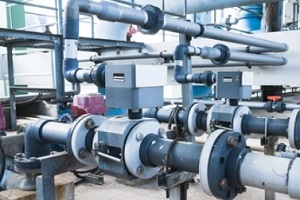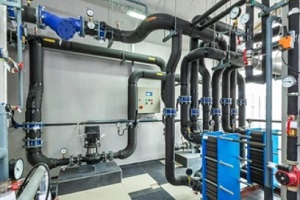 Water systems come in many shapes and sizes, and choosing the right one for your particular application is an important part of ensuring the long-term reliability, affordability and efficiency of your facility. One option that you may not yet have considered is a closed loop system.
Water systems come in many shapes and sizes, and choosing the right one for your particular application is an important part of ensuring the long-term reliability, affordability and efficiency of your facility. One option that you may not yet have considered is a closed loop system.
For those who are evaluating whether this choice is right for them, or if you have a closed loop system already and want to learn more about how it benefits your facility and how to care for it, you can begin by learning more about the basics. Closed loop systems can be powerful tools as long as they are cared for properly.
What Is A Closed Loop System?
The path that water takes through a building will naturally vary depending on how the building’s piping and water system is constructed. In this vein, building owners have options for how they want their system to be set up. While many people will select an open loop system because it can be economical, the water in this type of setup will pass into existing lines in order to return back to the supply, and it may not be fully protected from outside elements.
Conversely, a closed loop system has a dedicated return line specifically for moving the water back to its original source, preventing it from coming into contact with unwanted contaminants. Even if you utilize a closed loop system, you should still take care to filter your water and perform regular water treatments.
Why Filter A Closed Loop System?
If a closed loop system is so efficient at keeping water clean by preventing exposure to contaminants, why bother to filter it? The reality is that even though a closed loop will not experience the same risk factors as an open loop option, it can still be contaminated by new construction, as well as buildup in the pipes themselves from problems such as rust and scaling.
These suspended solids may pass through the water and collect in areas that you do not want them to be, such as cooling tower fans, where they can obstruct operation and foul equipment, leading to costly repairs or premature replacements.
Filtration in a closed loop system can vary, but typically, the most effective options are bag and cartridge filters to directly grab suspended solids, as well as sand filtration. While sand filtration can handle varying loads and is suitable for a range of water usages, bag and cartridge filters are primarily suited for smaller operations that recirculate no more than 2,000 gallons.
Benefits Of Utilized A Closed Loop
Closed loop systems come with their own set of benefits, and the fact that you must continue to perform regular water maintenance such as filtration and chemical treatment should not dissuade you from considering this option.
Greater Utility Efficiency
 Because closed loops keep water within the system, you can enjoy greater usage efficiency by not having to replace water that has evaporated. Similarly, in the winter, your system can continue to run without the risk of freezing, and closed loops tend to simply be more efficient in terms of pump speed and heat exchange as well. This can save you money on utility bills in the long run.
Because closed loops keep water within the system, you can enjoy greater usage efficiency by not having to replace water that has evaporated. Similarly, in the winter, your system can continue to run without the risk of freezing, and closed loops tend to simply be more efficient in terms of pump speed and heat exchange as well. This can save you money on utility bills in the long run.
Lower Overall Cost
Many people elect to install an open loop system because it is often economical at first, but it takes greater care and maintenance later on. Closed loop systems are simple to care for and can be a low-cost option over the long term.
Simpler Water Treatment Requirements
Because closed loop systems are not exposed to the same wide variety of contaminants that open loop systems experience, you may enjoy consistency in the types of risks that you will need to address in your water. A robust combination of adequate filtration, pH and mineral balancing and chemical treatment to address biological material should be sufficient to keep your closed loop system functioning safely and effectively for years to come.
Trust The Experts To Help You Understand How To Care For Your Closed Loop System
Whether you are considering a closed loop system for your facility, you already have one and have questions or you need help properly maintaining your water system through filtration and chemical treatment, you do not need to figure out all of the details on your own.
The experts at Tower Water set the standard in water treatment and would be happy to help you explore options for the type of water system that is right for you and how to properly maintain it for years to come. Reach out to learn more or to schedule an appointment to discuss your options and potential strategies.
